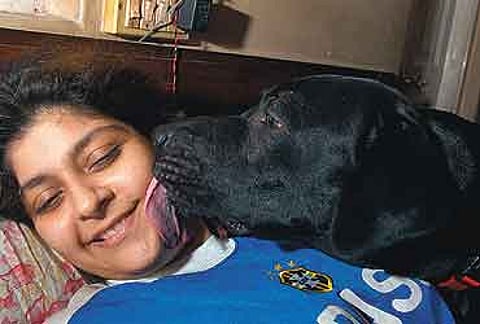His initial reluctance to wear a collar was overcome as Sanam stroked him. She also exposed him to objects of daily use like plastic bottles, hairbands and bristle brushes, getting him accustomed to different textures. Including metal; dogs hate its cold tinny taste on their tongues, but keys are a vital part of life. "Though he's young, male and all over, he's intelligent, a fast learner and most importantly, very gentle with Sanam," says Shirin, who started training him recently.
But Magic is still a dog, and sometimes during sessions, this gofer graduates to goofy and makes everyone laugh by giving in to his crazies. He will race after an imaginary tornado all around the house, till he gives up and flops down, panting heavily after the hectic storm-chasing.
At present, Shirin is the only Indian associate of the world-renowned canine behaviourist, John Rogerson, who advocates the "kindness approach". She bans the use of whips, electronic zappers and tortuous choke chains. "Dogs are creatures of survival, they'll do anything for a reward," says Shirin, who along with spouse Junaid has trained 1,000 dogs of various breeds, dealing with issues like aggression, destruction and house-training.
With Sera, another trainee assistance dog, the Merchants also have two search and rescue canines in residence: Sunny and Snoopy, who located five bodies under the debris after the 2001 Gujarat quake. The training technique: "find toy" that was planted on a play dead volunteer. Continual working with scent hints turned the duo into successful searchers and rescuers.
Never hurt and never forced, Magic loves his 15-minute sessions and 5-minute follow-ups. He's busy practising on his toy rope right now. Tugging comes naturally to all dogs, especially Labradors, who were bred to haul in fishermen's nets in Canada. This instinct will be generalised to cupboards and doors, where socks are tied to handles so Magic can be told "Pull-Open". This is impossible for Sanam, since her wheelchair obstructs the swing.
So too with switches that are mostly out of her reach. Magic will be given a play-board, with a switch and asked to paw it. Each time he does, he gets a treat of a bit of banana. The board is moved into various positions, outside a door, under a table, until he's finally pressing real switches, at any level. Soon, he'll be ringing doorbells and pressing lift buttons as well. Shirin expects this quick learner will be fully trained in two months.
Sanam is also convinced about success. Recently, she along with Honey, Shirin's dog, held an outdoor demonstration for Mumbai's Balmohan Vidyamandir School with her. Performing for 400 students with props, the fully-trained Honey opened a drawer, fetched a tissue box, barked at the 'help!' prompt and offered herself as support when Sanam pretended to slump. Environmentalist Bittu Sahgal, who has seen Honey in action, says: "Doctors and nurses should also see this. Not to impress them about what dogs can do, but to witness the therapeutic qualities of pets who can enhance our degraded lives."
Reversing the cliche about teaching an old dog new tricks, Honey was five when training began, yet mastered an amazing 50 commands in two months. Each requires actions normally used by dogs, like pulling, pushing, pawing and barking. Her rewards were a ball-throw, a pat or just an exultant "good dog" shout. Honey, ever eager to please, attempted everything, including difficult tasks like picking up a fallen coin by nudging it with her nose. She also learned how to tidy up by collecting litter and putting it in the bin! Front-loading washing machines were a cinch being positioned at her height. Else, if given a stool, she hops up and drops the dirty clothes into a top loader and unloads the laundry after spin dry.Curtains? If the drapes have draw cords, Honey can easily darken a room or let in sunlight.
Magic too is preparing to become an accomplished dogsbody. Perfectly house-trained, he goes down with a walker twice a day to relieve himself and check up on the neighbourhood smells and pee-mail.
Paired with Sanam, he's reducing canine-unfriendliness. Besides becoming a legitimate resident of a 'no dog' building, Magic has also earned acceptance from Mumbai's taxi drivers who usually refuse four-pawed passengers. Which is just as well, for once when he thought Sanam was leaving him behind; he took a flying leap into the cab right through the window! "When he's with me, people pay less notice to my wheelchair, Magic has helped me make friends, because they all want to know about him," says Sanam.
Former Society for Prevention of Cruelty to Animals (SPCA) member Supriya Bose calls Shirin a pioneer: "Animal trainers in India used force, intimidation and starvation till now. Working dogs performed due to fear of being hit or starved."
That seems a cruel way of repaying these bomb, avalanche and drug detectors. Moreover, as any member of an estimated population of 60 million disabled people will attest, it's hard to find domestic help attuned to their special needs. That's why this pet-pilot-project, led by Honey, Magic and Sera can show how canines can be wondrous caregivers. All for kind words and a daily bowl of food.
As for Sanam, her spirit and body strengthened by Magic, she's keen on creating awareness about comrades-in-paws. "Once he's trained, if I'm sponsored with a customised car then I want to show off my magical angel. It's really sad that people in India are so scared of dogs." Is Prescription Pet No. 1 ready? Woof-course! Anything. As long as nobody lays a finger on his favourite liver-licks!
When Paws Are Props
Assistance dogs, with their wondrous capabilities, are helping human buddies put their lives back on track

Published At:
Tags